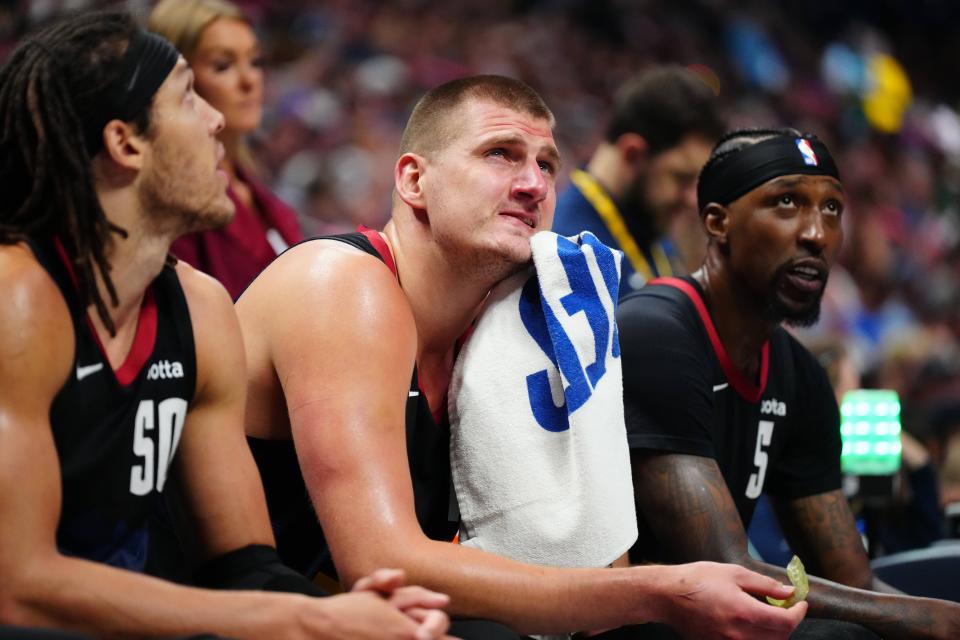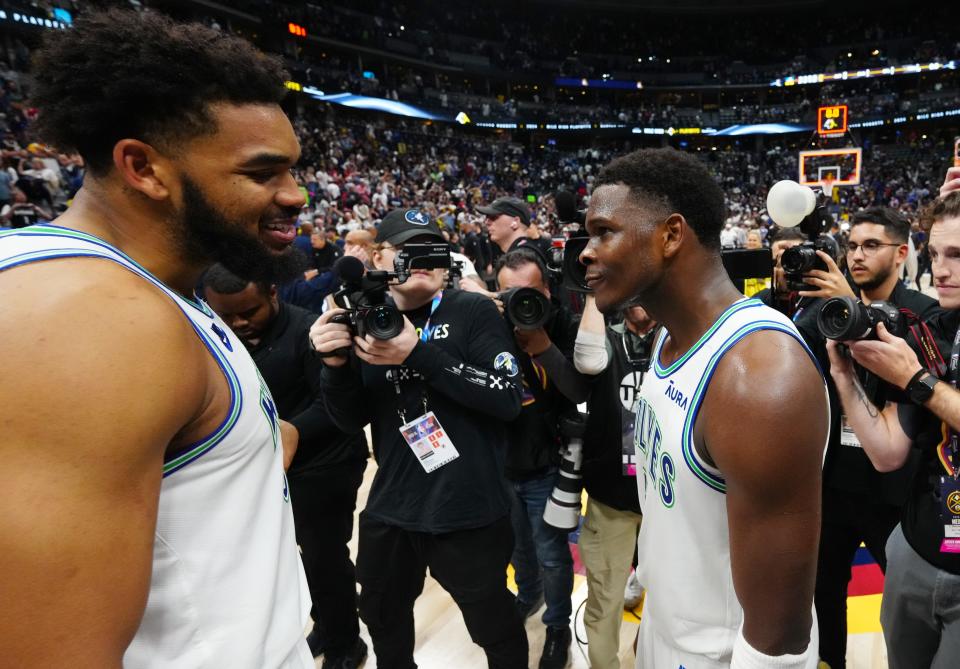There's no clear NBA title favorite. Get used to it − true parity has finally arrived
The Denver Nuggets’ stunning second-half meltdown in Sunday's Game 7 against the Minnesota Timberwolves ensures that this season will end with six different franchises winning the last six NBA titles. In fact, no team has even reached the Finals in back-to-back years since 2019, when Golden State was making its fifth straight Finals appearance − an unprecedented stretch of parity in a league that has historically seen teams go on multi-year championship runs.
Maybe this was the vision NBA commissioner Adam Silver and team owners had when they moved toward a more restrictive salary cap that makes great teams more difficult to keep together. Maybe it’s simply a product of the league’s longtime stalwarts like LeBron James and the Warriors core aging out of contention.
But what we have instead is maybe even more interesting than the usual carousel of dynasties: At this point in the NBA playoffs, there’s no clear favorite to win the championship.
Could it be the Timberwolves, whose defensive intensity and execution eventually broke a Nuggets team with a three-time MVP who seemed unstoppable?

Could it be the Boston Celtics, who have more playoff pedigree than any remaining contender but remain frustratingly reliant on their star wings making tough shots under pressure due to their lack of an elite playmaker?
Could it be the Dallas Mavericks, who have the world’s most gifted offensive player in Luka Doncic and a proven playoff shot-maker in Kyrie Irving?
Might the upstart Indiana Pacers, who had the good fortune to face two injury-ravaged teams in the first two rounds, be able to run-and-gun their way to the most surprising title of all time?
Given the way these playoffs have shaken out, it’s not a stretch to say all four teams have a right to believe they can win a championship this year − which is remarkable when you consider that the final four teams are a No. 1 seed, a No. 3, a No. 5 and a No. 6 in their respective conferences. How often does something like this ever happen? Given the history of the NBA, it’s almost unfathomable.
But finally, in the NBA’s 77th season, it seems we have reached an era of something close to true parity. It doesn’t appear to be a fluke, either. The way the league is set up, it’s far more likely that the next several years will see a churn of teams contend for titles rather than a stretch like 2011 to 2018 when only two franchises from the Eastern Conference and four from the West made the Finals.
Though the paradigm of what wins championships will change every decade or so, the common thread has been the necessity of having at least one generational talent. That was even true last year with Denver, whose lack of championship history didn’t seem relevant because it had the league's best player in Nikola Jokic.
NBA history would point to Jokic, after winning his first title, leading the Nuggets on a three- or four-year run where they’d be favored to at least win the Western Conference and probably get another championship or two barring injury or something unforeseen.
But the Nuggets' playoff demise this year exposed how small the margins really are. After losing the first two games of the series at home, they grabbed control by winning the next three and it seemed like the back-to-back chase was full go. Over the final two games, though, they looked spent. Denver managed just 37 points in the final half of Game 7 and got a combined 21 points from players not named Jokic and Jamal Murray.
Some of the postgame quotes coming out of Denver's locker room pointed to how difficult a season it was coming back as champions, both from a fatigue standpoint due to the shorter offseason and playing every night with a target on their backs.
Meanwhile, Anthony Edwards has arrived as the next possible entrant in the rare class of superstars who can be the best player on a championship team. But he’s not the only contender to join the club.

Doncic, obviously, has the ability to get there. Shai Gilgeous-Alexander is on the same trajectory for Oklahoma City, which nearly got the Dallas series back home for Game 7. And maybe Jayson Tatum can do it for Boston, though he’s already had a few excellent opportunities to deliver on that potential and hasn’t been able to close the deal. It probably won’t be too many more years before Victor Wembanyama enters the chat.
The point is, we’re not likely to see one guy grab the baton over the next half-decade the way James took it from Kobe Bryant, who took it from Michael Jordan. There’s a bunch of contenders all rising together, and that’s not the only factor when you start projecting who might win the next several NBA championships.
Under the league’s current financial model, building and sustaining around those guys − let’s call them the pre-generational players − will be harder than ever. With the way the NBA’s collective-bargaining agreement is now set up, another Warriors-like run seems almost impossible because of how expensive it becomes to keep a successful team together once the primary players hit their second and third contracts. That means owners and general managers will have to make more tough decisions as their payrolls get bigger, which means teams are going to make more mistakes.
And this year in particular, with disappointing teams like the Lakers, Heat, 76ers and Suns angling to make big roster moves, lots of significant players could be in new cities next season. With one or two tweaks, some of those teams could be right back in the mix.
In a way, all of this cross-traffic between the LeBron/Steph era and whatever comes next makes it easier to win a championship because so many more teams have a chance.
At the same time, that also makes it harder: Almost every playoff series, nearly every year, is going to be a coin flip.
Denver’s failure to defend its title or even come particularly close should make us hesitate before expecting another NBA dynasty. In this unprecedented era of parity, what seems like a window to never-ending playoff success can close quickly.
The paradigm in this NBA should be to grab the moment while you can. With Denver’s exit, one of these new superstars is going to have the opportunity to claim their first championship.
This article originally appeared on USA TODAY: Who will win NBA Finals? Who knows! Nuggets loss latest sign of parity

